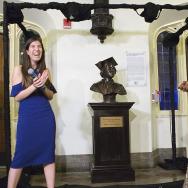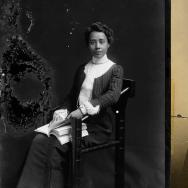In the summer of 1907, Georgiana Rose Simpson left Washington, D.C., to pursue a bachelor’s degree at the University of Chicago. A 41-year-old high school teacher, she enrolled with the goal of furthering her interests in German language and literature.
As a pathbreaking figure, Simpson faced racism and discrimination throughout her academic career. Shortly after she arrived at the University, she was forced to live off-campus when white students objected to sharing a dorm with a Black woman.
Despite such challenges, Simpson would earn three degrees from the University of Chicago—an AB in 1911, AM in 1920, and a Ph.D. in 1921, when she was 55 years old. Simpson became the first Black woman to receive a Ph.D. in the United States on June 14, 1921, followed within weeks by two scholars at other universities who also received their degrees that month.
A century later, UChicago faculty and students view the 100-year anniversary of Simpson’s historic achievement as an opportunity to not only recognize her life and work, but to reflect on the progress that has been made as well as the systemic barriers that women and people of color continue to face today.
“We should celebrate not only her accomplishment, but her resilience and her self-belief,” said Assoc. Prof. Adam Green, a scholar of African American history. “Because in a community that by today’s standards would be seen as unwelcoming, and perhaps even hostile, she persevered.”
At least 45 Black students had earned doctorates from the University of Chicago by 1943—believed to be more than at any other institution in the nation. Yet, Simpson’s story serves as a reminder of the struggles these students faced, and how structural inequality persists, even alongside incremental progress.
Her story also has inspired UChicago students to honor her memory. After UChicago students Asya Akça and Shae Omonijo helped unveil a bust of Simpson on campus in 2017, current third-years Marla Anderson and Dayo Adeoye founded the Georgiana Rose Organization last year to honor Simpson and help foster the advancement of Black women at UChicago.
“There’s a shared community of Black women scholars at UChicago, who—though they may face discrimination or hardship—continue to strive, push through, be courageous and confident, excel, and ultimately earn their degrees,” said Anderson, the organization’s president.
“We are proud to be an extension of Dr. Simpson’s story.”
Facing racism at UChicago
Simpson was born in Washington, D.C., on March 31, 1866 (or 1865, according to some sources). She began teaching at about age 20, and became interested in German language and culture after working with German immigrant children in her hometown. Decades into her teaching career, Simpson came to the University of Chicago to study German language and literature, as well as French. She also took courses in Latin, Greek and mathematics.
She elected to live in Green Hall, then a women’s dormitory, which led to protests from several Southern white women who lived there. They asked Sophonisba Breckinridge, the renowned social reformer and then-secretary to Marion Talbot, who held the position of “dean of women,” to force Simpson out.
Breckinridge, PhD 1901, JD 1904, decided Simpson should be allowed to stay, prompting five white women to leave the residence hall. However, then-president Harry Pratt Judson overruled Breckinridge, and forced Simpson to find housing off-campus.
The incident sparked public outcry and a response from multiple advocacy groups, which condemned Judson’s decision. The novelist and activist Celia Parker Woolley wrote to Judson and called on him to reverse his “deplorable” decision, noting that Black students at the University like Simpson were also “southerners” who deserved to have their rights and feelings considered.
“We ask you, sir, why you and others who so constantly defer to ‘southern’ sentiment on this question so invariably ignore the new and more progressive element in the south?” Woolley wrote in August 1907. Judson’s successor, Ernest DeWitt Burton, integrated UChicago dormitories after he took office in 1923.
Simpson remained a student, earning her bachelor’s degree primarily through summer and correspondence courses. Beginning in 1915, she pursued her master’s and doctorate, studying German Romanticism and philology. Her Ph.D. dissertation, written under noted German scholar Martin Schütze, was titled “Herder’s Conception of Das Volk.”
“For a long time, many have tried to understand what makes people [like Simpson] stick with things against the odds, and allows them to deal with really difficult situations but continue to come back,” said Melissa Gilliam, the Ellen H. Block Distinguished Service Professor of Health Justice and Vice Provost of UChicago.
Gilliam wondered if Simpson’s strong sense of purpose allowed her to carry on, in spite of what was happening around her. Today, she said, Simpson’s experience underscores the importance of creating an intellectual community where everyone not only feels safe and welcome, but empowered to carry out scholarship in whatever field they choose.
A leader in campus diversity and inclusion initiatives, Gilliam emphasized how vital these goals are: “Research demonstrates that if women and people of color do not feel valued in science classes, for example, they may say, ‘I’m not going to go into science.’ So it’s not about their ability, but about their sense of belonging and their perception of whether there is bias in that environment.”
Green said that when people such as Simpson are barred from pursuing their ambitions because of bias, society becomes impoverished, because others do not get the benefit of their talent and excellence.
“That’s something for people to contemplate in this moment when we continue to grapple with the afterlives of segregation within higher education today,” he said.
Roots in D.C.’s Black intellectual life
Following her graduate studies, Simpson returned to Washington, where she taught at Dunbar High School before becoming a professor at Howard University. Though she remained interested in German studies, she also contributed scholarship on Black subjects: In 1924, she published a critical edition and translation from French of a biography of Toussaint Louverture, the leader of the Haitian slave rebellion.
Despite her achievements, Simpson was barred from employment at many institutions; nonetheless, by teaching at Dunbar and later at Howard, she was able to reinvest in the strong Black communities that had contributed to her own success.
“By teaching in Washington, Simpson was actually paying forward the opportunities she had secured for herself, to benefit future generations of creative and ambitious young African Americans,” Green said.
Simpson retired in 1939 and died on Jan. 27, 1944. Over the course of her life, she befriended abolitionist Frederick Douglass and his second wife, whom she lived with after Douglass’ death in 1895; worked alongside early Black feminist Anna J. Cooper; and corresponded with civil rights activist and editor W. E. B. Du Bois, among other leading Black intellectuals of the day.
She was one of three Black women to earn doctorates in June 1921. Sadie T.M. Alexander earned a Ph.D. from the University of Pennsylvania a day later, on June 15, and Eva B. Dykes did the same at Radcliffe College (the former women’s college now a part of Harvard University) on June 22. All three women had attended secondary school in Washington, which was a center of Black intellectual life at the time, according to Green.
“Washington was a community that centered educational and often intellectual life for African Americans nationally,” Green said, “a community that valued education and training as the means by which to enable young people to pursue research, writing and thinking at the very highest levels.”
Carrying Simpson’s story forward
Thanks to the work of UChicago students, Simpson’s legacy has not been forgotten.
In 2017, then-UChicago students Asya Akça and Shae Omonijo, founders of The Dr. Simpson Fund (formerly called the Monumental Women Project) organized the installation of a bust of Simpson in the Reynolds Club—once open only to white men—opposite a plaque that commemorates Judson, who barred her from living on campus.
“100 years later, our nation is still confronting many challenges,” Akça and Omonijo said in a statement. “We urge students and alumni to continue to think not only about monuments that need to come down but also about those that still need to be put up.”
Anderson and Adeoye began the Georgiana Rose Organization last year to build a network of Black women and feminine-aligned, nonbinary students at UChicago. Its members have been active politically, advocating for legislation such as the CROWN Act, which protects natural Black hairstyles in the workplace and other venues. They have also organized outings to Black-owned businesses and Black-centered art exhibitions.
“Black feminist theory is rooted, in part, in the idea of ancestry and being connected to the people that came before us,” said Adeoye, the organization’s vice president. “That’s why it seemed appropriate to honor her. She is the pinnacle of what we can look to as Black excellence here.”
“I found that when I came to UChicago, a lot of my great experiences and interactions were with Black women—not only other students, but also faculty and staff,” Anderson said. “So the organization was formed in part out of an appreciation for the Black women that I’ve met here.”
In the United States, Black women faculty are still represented in tenure-track positions at a far lower rate than their peers, according to Gilliam—and many people from underrepresented groups still do not feel a sense of belonging at their institution. Universities need to be intentional and proactive about diversity and inclusion, Gilliam said, so that other underrepresented students can be supported both in their scholarship and in their academic communities.
“One hundred years after Georgiana Simpson graduated, we’re still talking about firsts for women of color,” Gilliam said. “Only this year did we have our first woman of color inaugurated as vice president of the United States. Ideally, we’ll continue to be a country that creates access for all people, regardless of background, so that 100 years from now, we’re not still marking firsts.”

